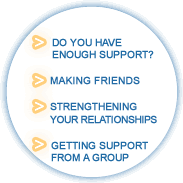You are here
Connect with Others
Connect with Others
 HOW CONNECTIONS HELP
HOW CONNECTIONS HELP
Your friend gets your joke. Your co-worker offers congrats. Your spouse hugs you hello. They are all helping you bust stress and boost well-being. In fact, Mental Health America found that 71 percent of people surveyed turned to friends or family in times of stress.
Humans are social animals: We crave feeling supported, valued and connected.
Research points to the benefits of social connection:
 Increased happiness. In one compelling study, a key difference between very happy people and less-happy people was good relationships.
Increased happiness. In one compelling study, a key difference between very happy people and less-happy people was good relationships.- Better health. Loneliness was associated with a higher risk of high blood pressure in a recent study of older people.
- A longer life. People with strong social and community ties were two to three times less likely to die during a 9-year study.
Sometimes connection is a heart-to-heart, spill-it-all-out talk. But sometimes it's just a laugh-out-loud e-mail.
CREATING CONNECTIONS
Connection happens when you get:
- concrete help, such as having a friend pick your kids up from school
- emotional support, like hearing someone say, "I'm really sorry you're having such a tough time"
- perspective, like being reminded that even the moodiest teenagers grow up
- advice, such as a suggestion to plan a weekly date with your wife
- validation, like learning that other folks love reading train schedules too
DO YOU HAVE ENOUGH SUPPORT?
One author called her support network her "pit crew," the people she could rely on to rev her up. Ask yourself if you have at least a few friends or family members who:
- feel comfortable to be with
- give you a sense you could tell them anything
- can help you solve problems
- make you feel valued
- take your concerns seriously
Want more ways to assess support? Go to http://www.heretohelp.bc.ca/skills/module3#survey.
MAKING FRIENDS
If you feel your current connections don't provide enough support, you can take steps to form new ones. Consider these suggestions:
- Enroll in a class that intrigues you. You'll know your classmates already share a common interest (and if you don't meet anyone, at least you'll have boosted your brain).
- Join a book group, hiking club or other group. If you want to make your entry smoother, consider contacting the group's leader in advance.
- Volunteer. Working together builds bonds, and helping others has its own rewards.
- Reach out—a lot. Especially if you're in a completely new situation, like starting college, you may need to meet lots of people before finding some that suit you.
If extreme shyness or anxiety prevents you from making friends, working with a therapist might help.
STRENGTHENING YOUR RELATIONSHIPS
If you want to get more out of the relationships you have, consider these steps:
- Make a list of the people you want to contact regularly. If necessary, add a reminder to your calendar.
- Commit to a certain amount of time together each day or week—without pagers, iPods or other distracting contraptions.
- Listen really well. Repeat what you heard to make sure you understood.
- Ask for specific kinds of help. Even the best of friends can't read your mind.
- Show how much you respect, support and appreciate your friends and family. You maythink positive thoughts, but sharing them works wonders.
- Move out of relationships that make you feel unsafe, lower your self-esteem or draw you into unhealthy habits, like abusing drugs.
If you're in a troubled relationship, it pays to work on it. Experts say a bad relationship can hurt you even more than a good one can help you. If your relationship is rocky, here are some suggestions:
- Take responsibility for your part in the problem
- Stay constructive and propose solutions
- Consider how you might feel if you were the other person
- Try to focus on what you value about the other person
If disagreements get intense, remember to fight fair. Researcher John Gottman, PhD, who has predicted with amazing accuracy which couples will divorce, says your fighting style really matters. Consider two great ways to reduce the heat:
- Avoid over-generalizing. Beware of statements like, "You never pay attention to me." Instead, make specific requests like, "Could we spend an hour together soon?"
- Avoid finger-pointing. Instead of blaming the other person, focus on how you feel with an "I" statement such as, "I feel upset when you come home and just read the newspaper."
When appropriate, try to forgive—for your own sake. Research shows that forgiving reduces tension, depression and anxiety. Of course, letting go can be tough. Try to:
- think about what stresses might have contributed to the other person's behavior
- contemplate what's good about that person
- ask for an apology if that would help
- remember that forgiving doesn't mean you're saying the behavior was acceptable
If you're having trouble expressing your needs or getting them met, consider individual or couples therapy.
GETTING SUPPORT FROM A GROUP
If you're facing a particular stress, like a serious illness, you may want to get additional support beyond what your friends and family can offer. Support groups can provide:
- concrete suggestions and information about the issue
- people who can empathize with how you are feeling
- a reminder that you're not alone
- inspiration from seeing others coping well
You'll likely benefit most from attending a group in person since hearing someone's voice and seeing the look on a person's face can really deepen connection, but if there's no group in your area, consider online support or discussion groups.
Mental Health America can help you find a support group. You can also learn out about support groups from your health care provider, local hospital or community center.
Reviewed by Sonja Lyubomirsky, PhD, a University of California, Riverside professor and author ofThe How of Happiness: A New Approach to Getting the Life You Want (Penguin Press).








this page